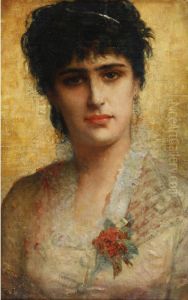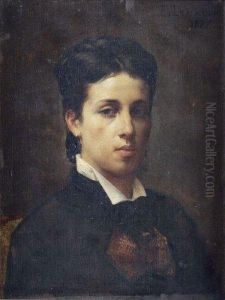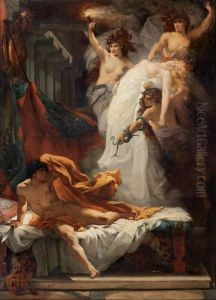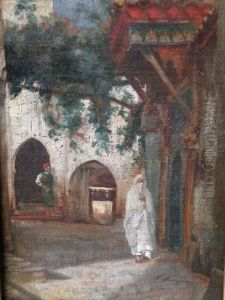Francois Fernand J. Lematte Paintings
François Fernand J. Lematte, also known as Fernand Lematte, was a French painter known for his academic style and his participation in the traditional art scene of France during the late 19th and early 20th centuries. Born on April 5, 1850, in Saint-Quentin, France, Lematte showed an early interest in art and pursued his passion by studying at the École des Beaux-Arts in Paris. He was a student of celebrated academic painters such as Alexandre Cabanel and William-Adolphe Bouguereau, who were influential figures in the French art establishment of the time.
Lematte's work is characterized by its adherence to the academic standards of painting, which emphasized classical themes, historical and mythological subjects, as well as a highly polished technique. His paintings often depicted serene and idealized figures, rendered with a smooth brushwork that sought to achieve perfection in form and composition.
In 1870, Lematte won the prestigious Prix de Rome for his painting 'The Death of Tiberius', which granted him a residency at the Villa Medici in Rome, an opportunity for young artists to study Italian masterpieces firsthand. This experience further influenced his artistic development and solidified his commitment to the academic style.
Throughout his career, Lematte exhibited his works at the Salon de Paris, the official art exhibition of the Académie des Beaux-Arts in Paris. His paintings were well-received, and he gained recognition among art collectors and the public. Lematte's contributions to art were also acknowledged through the receipt of various medals and honors, including the Legion of Honour, one of France's highest awards.
Despite the shifts in the art world and the rise of new movements such as Impressionism and Post-Impressionism that challenged the academic tradition, Lematte remained loyal to his classical roots. His works continued to be celebrated for their beauty and craftsmanship, although over time they fell out of favor with the avant-garde and those who sought to break away from traditional artistic conventions.
François Fernand J. Lematte passed away on December 22, 1929. Today, his works can be found in museum collections and are studied as examples of the academic art tradition of the late 19th century. While he may not be as well-known as some of his contemporaries who embraced more modern approaches, his contribution to French art history remains significant for its representation of the values and techniques of the academic school.








